US military jacket Civil War Confederate Soldier's Great military coat soldier
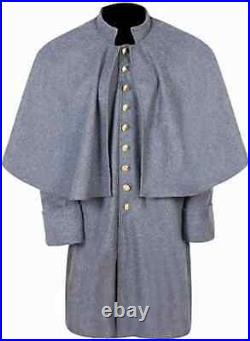
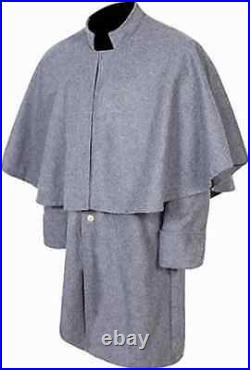
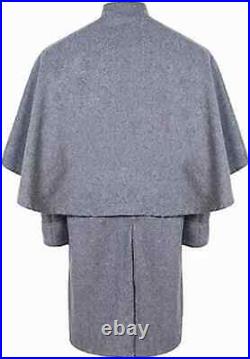
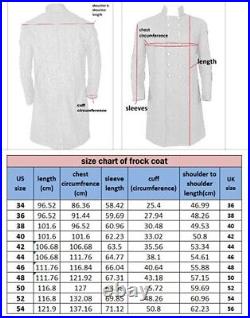
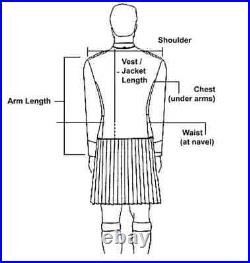
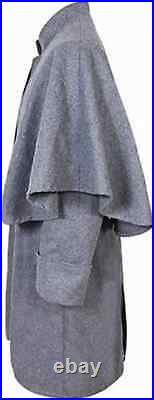
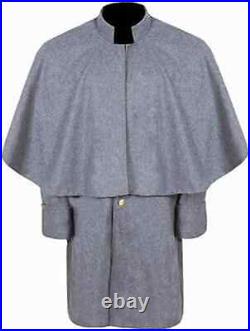

The Civil War military coat for both Confederate and Union soldiers was a key part of a soldier's uniform, offering both function and form. Below are detailed descriptions of several notable types of coats worn during the American Civil War, including the Confederate Soldier's Great Coat, the Civil War Union Junior Officer's Artillery Frock Coat, and the Civil War military sack coat. Confederate Soldier's Great Coat (Officers & Enlisted Men). The Confederate Soldier's Great Coat was an essential garment worn by soldiers to protect against harsh weather, particularly in colder conditions.
For Confederate officers, the great coat was often more refined in appearance than those worn by enlisted soldiers. Material : Typically made from wool, as wool was readily available, durable, and provided warmth in the colder months. The coat's color was usually gray or butternut (a brownish-gray), though some variations in color existed. The coat was double-breasted and knee-length, providing both warmth and functionality.
High collar, which could be turned up to protect against the cold. Large brass buttons with the Confederate States of America (CSA) insignia or simple brass buttons.
Epaulets or braiding for officers, distinguishing them from enlisted soldiers. Functional side pockets for carrying personal items. Purpose : The great coat was practical for field use, providing warmth during winter months or in mountainous areas, where soldiers often endured harsh weather conditions. Civil War Union Junior Officer's Artillery Frock Coat.
The Union Junior Officer's Artillery Frock Coat was a more formal garment worn by officers in the Union Army, including artillery officers. This coat distinguished officers from enlisted men and reflected military rank through its design and embellishments. Material : Like other Union coats, the frock coat was made from wool, typically in a navy blue color for the Union Army. Length : The frock coat typically extended to about the knee, offering a tailored fit that allowed for ease of movement while maintaining a formal appearance. Double-breasted, with brass buttons arranged in pairs along the front of the coat.The coat featured distinctive lapels and could include gold or gilt braid on the sleeves and cuffs for officers' rank. Officers of the artillery might have had specific braid or piping, which indicated their branch of service e. Standing collar and epaulets on the shoulders for rank identification. Pockets were often hidden or discreet but present for utility purposes.
Purpose : This coat was worn by junior officers in the Union Army, specifically in the artillery units, offering both practicality for battlefield use and a more formal appearance for ceremonial or inspection purposes. Civil War Military Sack Coat. The Military Sack Coat was a more basic and practical coat worn by Union soldiers, especially enlisted men, and later used by Confederate forces when resources were scarce.
Material : Made of wool or flannel fabric, the sack coat was generally less formal and more utilitarian than the frock coat. The wool fabric was durable and ideal for field use. Color : The color for Union soldiers was typically dark blue. Confederate soldiers often wore gray or butternut-colored sack coats when they could not obtain full military uniforms. The sack coat was single-breasted with a simple 3 to 4-button front.It had a loose, straight fit, which allowed for ease of movement and comfort during long marches or combat. Shorter length compared to the frock coat, typically ending just above the hips or around the waist. No collar or a simple, low-standing collar that was functional but not as ornamental as that of officer coats. Pockets were included for practical use, especially for carrying items like maps, ammunition, or personal effects. Purpose : The sack coat was worn primarily by enlisted men as a functional and durable option for the rigors of military life.
Its simple design made it easy to produce in large quantities, and it was typically the standard uniform for the Union infantry. Confederate Great Coat : Primarily worn by Confederate officers, this long wool coat was designed for warmth and was more refined in appearance. It featured high collars, brass buttons, and epaulets for officers. Union Junior Officer's Artillery Frock Coat : A more formal, knee-length wool coat worn by junior officers in the Union Army, particularly artillery. It featured tailored cuts, brass buttons, and specific decorative details to indicate rank. Military Sack Coat : A simple, functional coat worn by enlisted soldiers, typically single-breasted and made of wool or flannel. It was designed for ease of movement and practical field use, with a loose fit and minimal ornamentation.Each of these coats played a key role in the uniforms of Civil War soldiers, offering a balance of function, formality, and protection from the elements during one of the most tumultuous periods in American history.
